The New Student Council Takes Over Responsibilities


The new Executive Committee of the Student Council took office on Tuesday, December 15.
President of the Higher Education Council Yusuf Ziya Özcan attended a ceremony held at the Rector's Office, where the former Executive Committee members handed over their responsibilities to their newly elected successors.
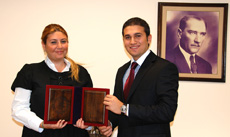
"It is with my utmost pleasure that I announce that our Student Council for the Academic Year 2009-2010 has been inaugurated," said Student Council President Alper Altınel. "I, on behalf of my colleagues, once again thank you for the confidence you have in us. As we work towards a better Bilkent, we will always keep in mind the confidence you've invested in us and strive to be worthy of your trust."
We would like to take this opportunity to wish the new members an exciting and productive year.
Fazıl Say Performs with BSO

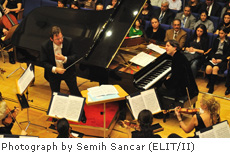
Internationally acclaimed Turkish Pianist and composer Fazıl Say performed as the guest soloist of the Bilkent Symphony Orchestra at the Bilkent Concert Hall on December 17 and 18. Classical music lovers had the opportunity to hear a program of pieces by Mozart and Shostakovich.They were also given the chance to enjoy works by Janacek and Mussorgsky as an encore from Say on both Thursday and Friday of last week.
The "UNICEF-Turkey Goodwill Ambassador" Bilkent Symphony Orchestra, conducted by Işın Metin, also performed the UNICEF Anthem (Turkish Premiere) for the first time in Turkey at the concert. The UNICEF Anthem, "Lullaby," is a new composition by UNICEF Canadian Ambassador Steve Barakatt. The lullaby underlines the 20th anniversary of the Convention on the Rights of the Child, signed on November 20, 1989 at the United Nations.
Produced in collaboration with other UNICEF Goodwill Ambassadors, musicians and video artists from around the globe, the lullaby is dedicated to the world's children and the realization of their rights.
The Bilkent Symphony Orchestra was named the "UNICEF-Turkey Goodwill Ambassador" last October.
New Exhibition Opens at the Library Art Gallery

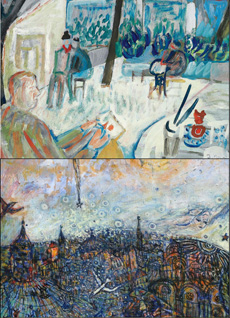
Works by prominent painters Bedri Rahmi Eyüpoğlu and his students Türkan Rador and Dilek Işıksel were showcased at the Bilkent Library Art Gallery's “Teaching and Learning” exhibit on Wednesday, December 16.
Dilek Işıksel opened 27 personnel exhibitions after her graduation in 1972 and participated in 70 national and international mixed exhibitions. She opened her last personal show in November 2007 in İstanbul. A theme of İstanbul's rich cultural history has run through her paintings since 1997, where she has been working in the Beyoğlu Kuledibi Art Studio.
 Türkan Tadaor completed her painting studies at the Bedri Rahmi Art Studio in 1971. From 1971 she put on personal and mixed exhibitions in Belgium and France. She currently works in İstanbul. Her art can be found in various official and private institutions, and in private collections like the Resim Heykel Müzesi, the National Library, Eskişehir University, and Ben and Gray in the United States. Türkan Tadaor completed her painting studies at the Bedri Rahmi Art Studio in 1971. From 1971 she put on personal and mixed exhibitions in Belgium and France. She currently works in İstanbul. Her art can be found in various official and private institutions, and in private collections like the Resim Heykel Müzesi, the National Library, Eskişehir University, and Ben and Gray in the United States.
The Bilkent exhibit will run from December 16 to January 15 at the Main Campus Library from 10:30 a.m. to 6 p.m. on weekdays. |
Lunch Time Lecture Explores “A Different Story of Secularism”

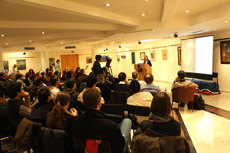
On Wednesday last week, December 16, Dr. Dilek Kaya Mutlu, assistant professor in the Department of Graphic Design, delivered an extremely interesting and thought-provoking talk entitled “A Different Story of Secularism: The Censorship of Religion in Turkish Films of the 1960s," as part of the Library Lunchtime Lecture series, to a packed audience in the Library's Art Gallery. Dr. Kaya Mutlu's main subject was the activities of the Merkez Film Kontrol Komisyonu (Central Film Regulation Commission) during the 1960s and early '70s, based on her research using thousands of reports by the Commission. By way of context, she started her talk by briefly sketching the political history of the Turkish Republic until the 1970s and then introduced the Commission and its work with reference to the issues of secularism and religion. The Commission censored Turkish films according to ten broad criteria, ranging from individual morality to offense against the republic.
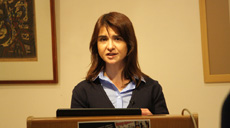
Dr. Kaya Mutlu argued that the essentially secular and 'Kemalist' perspective of the Commission resulted in a very careful scrutiny of the depiction of Islam in film: while not anti-religious, the Commission sought to promote a view of Islam as a private commitment between the individual and God, and duly censored films that did not promote this idea. Movies that presented traditional Muslim teachers (hocalar) as reactionary and unenlightened were passed for public viewing, and those dealing directly or indirectly with Alevi Islam were also carefully controlled. On the other hand, films about historical Muslim figures and the early history of Islam were less thoroughly censored. The Commission was not free from external influence, and the changing political scene, especially the rise of the Adalet Partisi (Justice Party), seems to have affected the decisions made by the commissioners. At the end of her lecture, Dr. Kaya Mutlu answered questions from the audience, and discussed the matter of religion and censorship today. This was the last Library Lunchtime Lecture for this semester. The series will resume in the Spring.
Also in this issue:



Bilkent News Interactive is
best viewed by 800x600 resolution.
You can send comments, questions, etc. about Bilkent News Interactive by clicking this
link.
|







